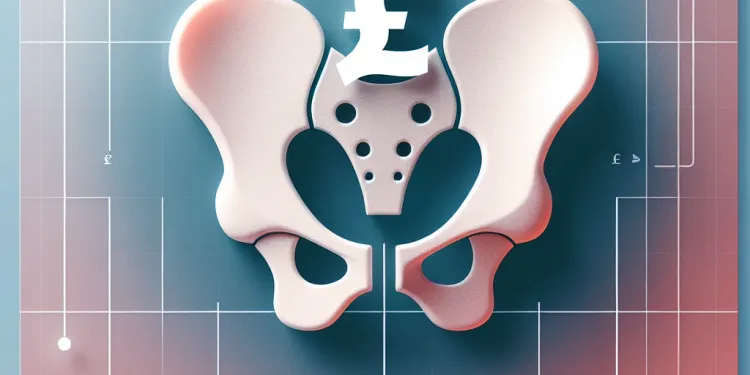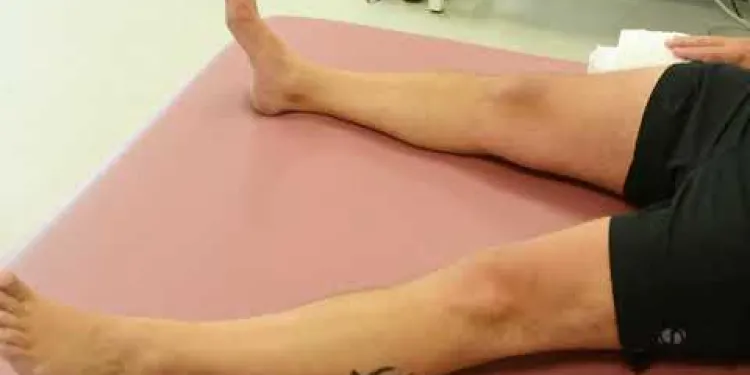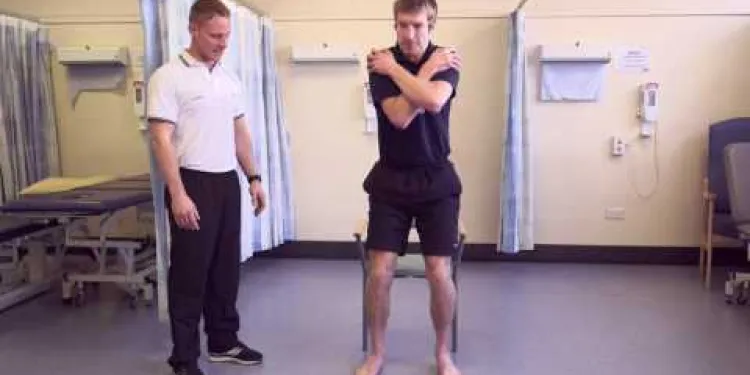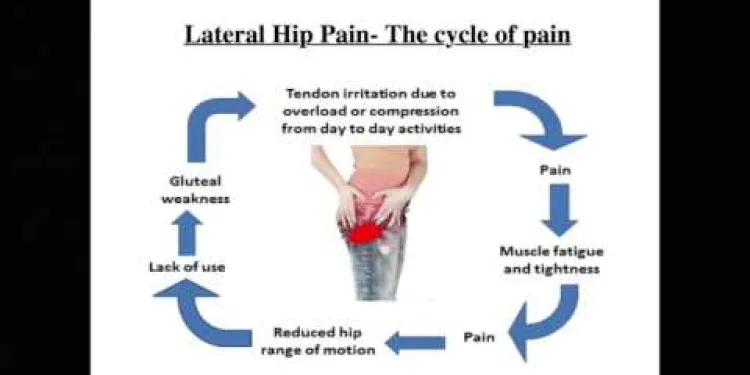
Find A Professional
More Items From Ergsy search
-

What is a hip replacement?
Relevance: 100%
-

What type of anaesthesia is used during hip replacement surgery?
Relevance: 89%
-

What is minimally invasive hip replacement surgery?
Relevance: 88%
-

How long does a hip replacement surgery take?
Relevance: 86%
-

Can both hips be replaced at the same time?
Relevance: 81%
-

How much does hip replacement surgery cost in the UK?
Relevance: 76%
-

Hip replacement
Relevance: 73%
-

Do I need a Hip Replacement?
Relevance: 70%
-

What are the risks associated with hip replacement surgery?
Relevance: 69%
-

A journey to hip surgery
Relevance: 68%
-

Total hip replacement
Relevance: 67%
-

Joint School - Hip Exercises
Relevance: 62%
-

Total Hip Replacement
Relevance: 61%
-

Total hip replacement at Northumbria Healthcare
Relevance: 60%
-

Knee replacement
Relevance: 59%
-

Your anaesthetic choices for your planned hip or knee replacement surgery at the RUH.
Relevance: 56%
-

How do I prepare for hip replacement surgery?
Relevance: 53%
-

What is the recovery time for a hip replacement?
Relevance: 53%
-

Will I need physical therapy after a hip replacement?
Relevance: 51%
-

What British Council Scholarships/Bursaries may be available to help me with the education costs of my child?
Relevance: 46%
-

Are there different types of hip implants?
Relevance: 44%
-

Osteoarthritis of the Hip
Relevance: 44%
-

Can relationship problems be resolved to improve mental health?
Relevance: 42%
-

Enhanced Recovery - Hip
Relevance: 42%
-

Can ending a toxic relationship improve my mental health?
Relevance: 41%
-

Exercises to help your lateral hip pain
Relevance: 41%
-

Lumbar surgery | NHS
Relevance: 41%
-

Spinal Anaesthesia for Caesarean Section
Relevance: 40%
-

Is it better to stay in a relationship for the sake of not being alone?
Relevance: 40%
-

Prostate Surgery
Relevance: 40%
-

What are the benefits of relationship counselling?
Relevance: 39%
-

Is it normal to feel sad in a relationship sometimes?
Relevance: 39%
-

Total knee replacement
Relevance: 39%
-

Cataract surgery can resolve life long short-sightedness?!
Relevance: 39%
-

Osteoarthritis of the Hip
Relevance: 38%
-

Can physical symptoms be linked to relationship-induced depression?
Relevance: 38%
-

Does the National Trust offer internships?
Relevance: 37%
-

How can a relationship contribute to depression?
Relevance: 37%
-

Advice - How to manage your lateral hip pain
Relevance: 36%
-

Thyroid eye disease. Squint surgery - The operation
Relevance: 35%
Types of Anaesthesia for Hip Replacement Surgery
During hip replacement surgery, selecting the appropriate type of anaesthesia is crucial for patient comfort and surgical success. In the UK, anaesthesia options for this procedure primarily include general anaesthesia, spinal anaesthesia, and epidural anaesthesia. Each type has its own indications, benefits, and considerations, and the choice largely depends on the patient's medical history, the anaesthetist's and surgeon's recommendations, and patient preference.
General Anaesthesia
General anaesthesia is a common choice for hip replacement surgeries. It involves administering drugs that cause the patient to lose consciousness entirely. This type of anaesthesia is beneficial because it allows the surgical team to operate without causing the patient discomfort or awareness of the procedure. The anaesthetic is delivered through a combination of intravenous medications and inhaled gases. Despite its widespread use, general anaesthesia can have side effects, including nausea, vomiting, and a longer recovery time post-surgery. Additionally, there is a need for close monitoring of the patient's vital functions during the procedure.
Spinal Anaesthesia
Spinal anaesthesia is another frequently used method for hip replacement surgeries in the UK. It involves injecting an anaesthetic directly into the cerebrospinal fluid in the lower back, which results in numbness below the waist. This type of anaesthesia is advantageous because it often leads to fewer side effects such as nausea and offers a quicker recovery time compared to general anaesthesia. Moreover, patients usually remain awake during the procedure, although sedatives can be given for relaxation if needed. Spinal anaesthesia is typically considered safer for patients with certain health conditions, such as respiratory issues or the elderly, where avoiding general anaesthesia is preferable.
Epidural Anaesthesia
Similar to spinal anaesthesia, epidural anaesthesia involves administering an anaesthetic to the epidural space around the spinal cord. However, the technique differs as it can be continuously administered through a catheter, allowing for extended pain relief both during and after surgery. While epidural anaesthesia may not be as commonly utilized for hip replacements as spinal anaesthesia, it remains a viable option, particularly when post-operative pain control is a priority. Epidural anaesthesia can also be used in combination with spinal or general anaesthesia to enhance pain management.
Choosing the Right Anaesthesia
The decision on which type of anaesthesia to use is a collaborative one, made between the patient, anaesthetist, and surgical team. Factors such as the patient's overall health, existing medical conditions, and personal preferences are weighed alongside the anaesthetist's expertise and the surgeon's recommendations. Ultimately, the aim is to ensure the patient's safety and comfort while facilitating optimal surgical conditions and effective recovery post-surgery.
Types of Sleep Medicines for Hip Surgery
When someone has hip surgery, doctors use special sleep medicines. These medicines help keep the patient comfortable. In the UK, the main types of sleep medicines for this surgery are general sleep medicine, spinal sleep medicine, and epidural sleep medicine. Each type is different. The right choice depends on the patient's health, what the doctors say, and what the patient likes.
General Sleep Medicine
General sleep medicine is often used for hip surgeries. It makes the patient fall asleep completely during the operation. This way, the patient doesn’t feel anything and doesn’t know what's happening. The medicine is given through a drip or mask. While it works well, it can cause dizziness, upset stomach, and takes longer to feel better afterward. Doctors closely watch the patient's heart and breathing during the surgery.
Spinal Sleep Medicine
Spinal sleep medicine is another choice for hip surgeries. Here, medicine is given into the lower back. This makes the bottom half of the body numb. With this type, there are usually fewer problems like dizziness. Patients wake up faster after surgery, too. Patients are awake during surgery, but they can have something to help them relax. This type is safer for people with breathing problems or older adults.
Epidural Sleep Medicine
Epidural sleep medicine is like spinal, but it's given in a different way. It goes into a small space near the backbone. A tiny tube can give more medicine if needed during and after surgery. While not used as much for hip surgery, it's good for extra pain help after the operation. It can be used together with other sleep medicines to help with pain.
Picking the Right Sleep Medicine
Choosing which sleep medicine to use is a team decision. The patient, sleep doctors, and surgeons all talk about it. They think about the patient’s health, any sicknesses they have, and what the patient likes. The goal is to keep the patient safe and comfortable while making the surgery go well and helping them feel better quickly afterward.
Frequently Asked Questions
What type of anesthesia is commonly used during hip replacement surgery?
General anesthesia and regional anesthesia, such as spinal or epidural anesthesia, are commonly used during hip replacement surgery.
Can local anesthesia be used for hip replacement surgery?
Local anesthesia is typically not used alone for hip replacement surgery; instead, general or regional anesthesia is preferred.
What is general anesthesia in the context of hip replacement?
General anesthesia involves rendering the patient fully unconscious, so they do not feel pain during hip replacement surgery.
What is regional anesthesia for hip replacement surgery?
Regional anesthesia, such as spinal or epidural anesthesia, numbs the lower half of the body, allowing the patient to remain awake while pain-free.
Is sedation used along with regional anesthesia for hip replacement?
Yes, sedation is often used with regional anesthesia to keep the patient relaxed and comfortable during hip replacement surgery.
What are the benefits of using regional anesthesia for hip replacement?
Regional anesthesia can result in less nausea, quicker recovery, and potentially less blood loss compared to general anesthesia.
How does spinal anesthesia work for hip replacement surgery?
Spinal anesthesia involves injecting medication into the spinal fluid, numbing the lower body during hip replacement surgery.
What is epidural anesthesia in the context of hip replacement surgery?
Epidural anesthesia involves placing medication near the spinal cord to block pain signals, often used in combination with sedation.
Can a patient choose the type of anesthesia for hip replacement?
Patients can discuss their preferences with their anesthesiologist, who will recommend the best option based on medical history and surgery specifics.
What factors influence the choice of anesthesia for hip replacement?
Factors include patient health, age, medical history, and the surgeon's and anesthesiologist's recommendations.
How long does it take to recover from anesthesia after hip replacement surgery?
Recovery from anesthesia varies, but most patients regain full alertness within a few hours post-surgery.
Are there risks associated with general anesthesia for hip replacement?
While generally safe, general anesthesia carries risks like allergic reactions, breathing problems, and heart complications.
Are there risks associated with regional anesthesia for hip replacement?
Regional anesthesia risks include headache, infection, or nerve damage, though serious complications are rare.
Does the type of anesthesia affect post-operative pain management in hip replacement?
The choice of anesthesia may influence initial post-operative pain management strategies and recovery experiences.
Is it possible to feel pain during hip replacement surgery under anesthesia?
Properly administered anesthesia should prevent pain during surgery; however, patients should inform their doctor about any discomfort.
What role does an anesthesiologist play in hip replacement surgery?
An anesthesiologist administers anesthesia, monitors vital signs, and ensures the patient's comfort and safety during surgery.
Can anesthesia affect recovery time after hip replacement?
Yes, the type of anesthesia can affect recovery time, as regional anesthesia often enables faster mobilization post-surgery.
Do patients wake up immediately after hip replacement surgery under general anesthesia?
Patients typically wake up shortly after surgery concludes, but might feel groggy for a few hours as they recover from general anesthesia.
Is it normal to experience side effects from anesthesia after hip replacement surgery?
Some side effects like drowsiness, nausea, or sore throat are common but tend to resolve shortly after surgery.
What should a patient discuss with their anesthesiologist before hip replacement surgery?
Patients should discuss their medical history, any allergies, preferences, and concerns about anesthesia with their anesthesiologist.
What kind of medicine is used to make you sleep during hip surgery?
When doctors do hip surgery, they use special sleep medicine. This medicine helps you not feel pain. It also makes you sleep during the surgery.
If you find reading hard, you can:
- Ask a friend or family member to help you.
- Listen to the information if there is an audio version.
- Use tools like text-to-speech to hear the words.
Doctors use special types of medicine during hip surgery. These help you not feel pain. One kind is called general anesthesia. It makes you sleep during the surgery. Another kind is regional anesthesia, like spinal or epidural anesthesia. This type makes only part of your body feel numb.
Can doctors use medicine to numb your body for hip surgery?
Doctors usually don’t just use local numbing medicine for hip replacement surgery. Instead, they use numbing for the whole body (general anesthesia) or a big part of the body (regional anesthesia).
What is general anesthesia for hip surgery?
General anesthesia is special medicine that makes you sleep during the operation. You won't feel anything and won't remember the surgery. This medicine is important for big operations like hip replacement.
If you want help understanding more, ask a doctor or nurse to explain. You can also use helpful tools like pictures or videos that show how surgery works.
When you have a hip replacement, doctors give you strong medicine to make you sleep. This way, you won't feel any pain during the surgery.
What is regional anesthesia for hip replacement surgery?
Regional anesthesia is medicine to help you feel less pain during hip surgery.
This medicine makes a big part of your body numb, so you don't feel the surgery.
Sometimes, you might still be awake during the surgery, but you will not feel pain where the surgery is.
Doctors use a needle to put the medicine near your hip.
If you feel nervous, you can ask for help like listening to music or having someone you trust with you.
Remember, it's okay to ask questions if you don't understand something about your surgery.
Regional anesthesia makes the lower part of your body numb. This means you won't feel pain there. You can stay awake while the doctor works.
Do doctors use medicine to help you relax when getting a hip replacement?
Yes, doctors use medicine to help you feel calm and comfy during hip surgery.
Why is it good to use regional anesthesia for hip replacement?
Regional anesthesia is medicine that makes a part of your body numb. It helps during hip replacement surgery. Here are some good things about it:
- You feel less pain.
- It can help you get better faster.
- There is less chance of feeling sick after surgery.
- It can be safer for your heart and lungs.
If you need help reading, you can:
- Ask someone to read with you.
- Use an app that reads text out loud.
- Break the text down into smaller parts.
Regional anesthesia can help you feel less sick, get better faster, and you might lose less blood than with general anesthesia.
How does spinal anesthesia work for hip replacement surgery?
What is Spinal Anesthesia?
Spinal anesthesia is a medicine that helps you not feel pain. It is used during some surgeries.
How Does It Help in Hip Surgery?
In hip replacement surgery, doctors fix your hip bone. Spinal anesthesia helps you sleep and feel no pain during this time.
How Does It Work?
The doctor gives you a shot in your back. This stops the nerves from sending pain messages. You will not feel the lower part of your body.
What to Expect?
While the doctor works on your hip, you will be asleep and will not feel anything. You will wake up after the surgery is done.
Helpful Tools:
Ask the doctor to explain with pictures. You can also watch videos for better understanding.
Doctors use spinal anesthesia to make hip surgery less painful. They put medicine into the fluid around your spine. This medicine makes your lower body numb so you don't feel pain during the operation.
What is epidural anesthesia for hip surgery?
An epidural is a special medicine that helps stop pain. Doctors use it during hip surgery. It makes the area around your hips numb so you don’t feel pain.
You stay awake, but you are very comfortable. The doctor puts the medicine near your spine. It works well and helps you feel better during and after the surgery.
If you are worried, you can talk to the doctor about it. You can also have a family member with you to help you feel calm.
An epidural is when doctors give medicine near your spine. This helps to stop pain. Sometimes, they give you medicine to help you relax too.
Can you pick the kind of medicine to make you sleep during hip surgery?
Patients can talk about what they like with the person who gives them medicine to sleep during surgery. This person will tell them the best choice based on their health and the surgery they will have.
What things help doctors decide which anesthesia to use for hip surgery?
Things that matter are how healthy the person is, how old they are, their past health problems, and what the doctor and the sleep doctor suggest.
How long until you wake up after sleep medicine for hip surgery?
After hip surgery, doctors give you special sleep medicine. It helps you sleep during the operation.
When the surgery is over, it takes a little time to wake up fully. Usually, you might feel sleepy for a few hours.
Here are some tips that might help you:
- Ask someone you trust to be with you after the surgery.
- If you feel dizzy, sit or lie down until it goes away.
- Drink water when the doctor says it's okay.
Always talk to your doctor or nurse if you have questions.
Waking up after an operation is different for everyone. But most people feel awake a few hours after the surgery.
Are there dangers with using anesthesia for hip surgery?
When people have hip surgery, doctors sometimes use a special sleep medicine called anesthesia. This helps you sleep during the operation, so you don't feel pain.
But, like any medicine, anesthesia can have some dangers. Here are some things to know:
- This medicine can make some people feel sick or dizzy.
- Sometimes, it can cause a headache.
- In rare cases, it can cause breathing problems or heart issues.
It's important to talk to your doctor before surgery. Ask them any questions you have. You can also tell them if you have allergies or other health problems. This helps the doctor keep you safe.
If you feel nervous, you can:
- Write down your questions to ask the doctor.
- Bring someone you trust to the doctor's appointment.
- Use calming techniques like deep breathing or listening to music.
Remember, your doctor is there to help you and keep you safe during your hip surgery.
General anesthesia is usually safe, but there are some risks. These can include allergic reactions, trouble breathing, and heart problems.
Are there any risks with using regional anesthesia for hip surgery?
Regional anesthesia is when doctors make a part of your body numb. Sometimes, it can cause a headache, an infection, or hurt a nerve. But don't worry, these serious problems don’t happen very often.
Does the type of anesthesia affect pain after hip surgery?
This question is asking if different kinds of anesthesia change the pain you feel after hip surgery. Anesthesia is medicine that helps you not feel anything during surgery.
Here is how you can understand this better:
- Anesthesia: It's medicine given before surgery so you don't feel pain when you are being operated on.
- Post-operative pain: This is the pain you might feel after the surgery is done.
To make it easier to understand, you can:
- Talk to your doctor or nurse. They can explain it simply.
- Watch a video about hip surgery and pain care.
- Ask someone to read and discuss it with you.
The type of medicine used to make you sleep during an operation can affect how you feel pain afterward and how you get better.
Can you feel pain during hip surgery if you are asleep?
When you have hip surgery, doctors give you medicine called anesthesia. This medicine helps you sleep very deeply. It also stops you from feeling pain during the surgery.
If you are worried, talk to your doctor. They can tell you more about how the medicine works.
It might help to watch simple videos about anesthesia or use a picture book to understand better.
When doctors give you the right medicine, you should not feel pain during the surgery. But if you do feel pain, tell your doctor.
What does an anesthesiologist do during hip replacement surgery?
An anesthesiologist is a doctor who makes sure you do not feel pain during surgery. They give you medicine to help you sleep or not feel anything in your hip.
Before surgery, they check your health. During surgery, they watch over you and make sure you are safe. After surgery, they help you wake up safely.
Tools like picture stories or apps can help you understand more.
An anesthesiologist is a doctor who helps keep you safe and comfortable during surgery. They give medicine called anesthesia so you don't feel pain. They also watch your important body signs, like your heartbeat and breathing, to make sure everything is okay.
- Tip: Ask your doctor questions if you need help understanding.
- Tool: Use pictures or videos to help explain what happens during surgery.
Can medicine for pain change how fast you heal after hip surgery?
Yes, the kind of medicine that makes you sleep during surgery can change how quickly you get better. Using medicine that only makes a small part of your body numb can help you move around sooner after the surgery.
Here are some tips and tools that can help you understand this better:
- Ask your doctor to explain what kind of sleep medicine you will get.
- Use pictures or videos to see how the medicine works.
- Talk to a nurse if you have questions after the surgery.
- Ask for a simple list of what to do and not do after surgery.
Do people wake up right after hip surgery with sleep medicine?
When you have hip surgery, doctors might use sleep medicine so you don't feel anything. This is called general anesthesia.
You won't wake up right away after the surgery. It takes a little time.
A nurse will watch you and make sure you are okay.
If you want to understand better, you can use pictures or ask someone to explain.
After an operation, patients usually wake up soon. They might feel sleepy for a few hours because of the medicine used during the surgery.
Is it normal to feel different after medicine used in hip surgery?
After hip surgery, doctors give you a special kind of medicine so you don't feel pain. This is called anesthesia.
It's common to feel a bit different because of this medicine. Some people might feel sleepy, a little sick, or see things in a blurry way.
If you feel worried or if the feelings don't go away, you can ask your doctor or nurse for help.
It can also be helpful to talk with someone about how you’re feeling. You can use a picture board or a simple book to help talk about it.
After surgery, some people might feel sleepy, sick to their stomach, or have a sore throat. These feelings are common and usually go away soon.
If you need help understanding, you could use pictures or talk to someone about it. Listening to calming music or having a favorite toy nearby might also help you feel better.
What to talk about with your anesthesiologist before hip surgery
Here are some things you should talk about with your anesthesiologist before your hip surgery:
- Tell them about any medicines you take.
- Talk about any allergies you have.
- Ask about the type of anesthesia you will get.
- Ask what you will feel like after the surgery.
- Tell them if you have any worries or fears.
You can use pictures or write things down to help remember what to say.
Talk to your doctor about your health, any allergies you have, and what you like or feel worried about with the medicine that makes you sleep during surgery.
Useful Links
- Ergsy carfully checks the information in the videos we provide here.
- Videos shown by Youtube after a video has completed, have NOT been reviewed by ERGSY.
- To view, click the arrow in centre of video.
- Most of the videos you find here will have subtitles and/or closed captions available.
- You may need to turn these on, and choose your preferred language.
- Go to the video you'd like to watch.
- If closed captions (CC) are available, settings will be visible on the bottom right of the video player.
- To turn on Captions, click settings .
- To turn off Captions, click settings again.
More Items From Ergsy search
-

What is a hip replacement?
Relevance: 100%
-

What type of anaesthesia is used during hip replacement surgery?
Relevance: 89%
-

What is minimally invasive hip replacement surgery?
Relevance: 88%
-

How long does a hip replacement surgery take?
Relevance: 86%
-

Can both hips be replaced at the same time?
Relevance: 81%
-

How much does hip replacement surgery cost in the UK?
Relevance: 76%
-

Hip replacement
Relevance: 73%
-

Do I need a Hip Replacement?
Relevance: 70%
-

What are the risks associated with hip replacement surgery?
Relevance: 69%
-

A journey to hip surgery
Relevance: 68%
-

Total hip replacement
Relevance: 67%
-

Joint School - Hip Exercises
Relevance: 62%
-

Total Hip Replacement
Relevance: 61%
-

Total hip replacement at Northumbria Healthcare
Relevance: 60%
-

Knee replacement
Relevance: 59%
-

Your anaesthetic choices for your planned hip or knee replacement surgery at the RUH.
Relevance: 56%
-

How do I prepare for hip replacement surgery?
Relevance: 53%
-

What is the recovery time for a hip replacement?
Relevance: 53%
-

Will I need physical therapy after a hip replacement?
Relevance: 51%
-

What British Council Scholarships/Bursaries may be available to help me with the education costs of my child?
Relevance: 46%
-

Are there different types of hip implants?
Relevance: 44%
-

Osteoarthritis of the Hip
Relevance: 44%
-

Can relationship problems be resolved to improve mental health?
Relevance: 42%
-

Enhanced Recovery - Hip
Relevance: 42%
-

Can ending a toxic relationship improve my mental health?
Relevance: 41%
-

Exercises to help your lateral hip pain
Relevance: 41%
-

Lumbar surgery | NHS
Relevance: 41%
-

Spinal Anaesthesia for Caesarean Section
Relevance: 40%
-

Is it better to stay in a relationship for the sake of not being alone?
Relevance: 40%
-

Prostate Surgery
Relevance: 40%
-

What are the benefits of relationship counselling?
Relevance: 39%
-

Is it normal to feel sad in a relationship sometimes?
Relevance: 39%
-

Total knee replacement
Relevance: 39%
-

Cataract surgery can resolve life long short-sightedness?!
Relevance: 39%
-

Osteoarthritis of the Hip
Relevance: 38%
-

Can physical symptoms be linked to relationship-induced depression?
Relevance: 38%
-

Does the National Trust offer internships?
Relevance: 37%
-

How can a relationship contribute to depression?
Relevance: 37%
-

Advice - How to manage your lateral hip pain
Relevance: 36%
-

Thyroid eye disease. Squint surgery - The operation
Relevance: 35%